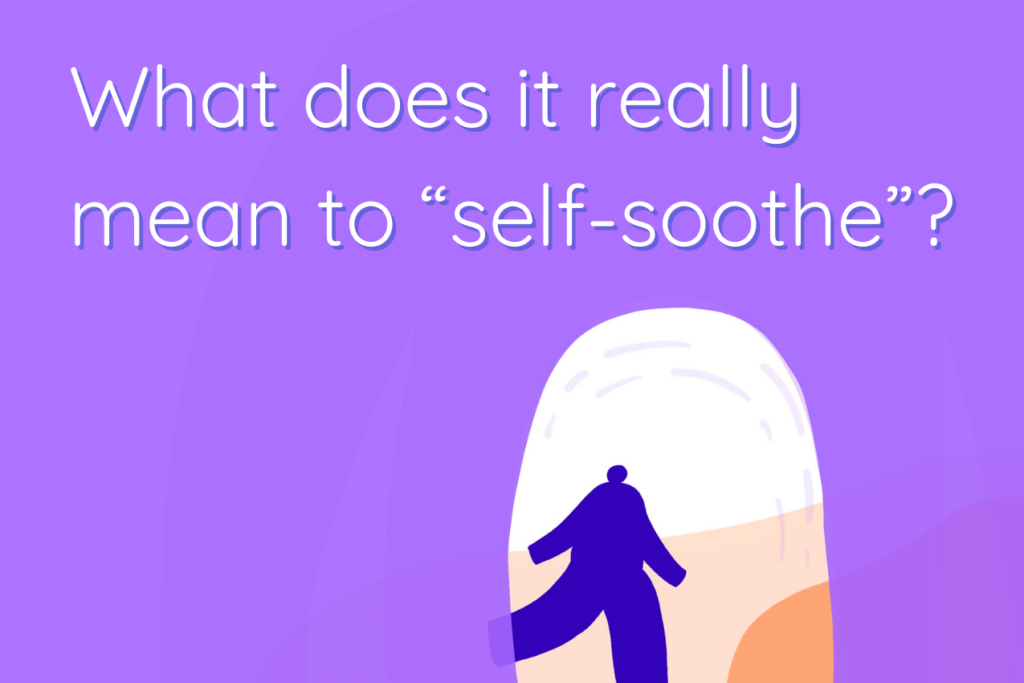What does it really mean to “self-soothe”?
January 2022
The term self-soothe is most commonly used to describe the ability of a young child to regulate their own emotions without the physical presence of a caregiver. This ability is very important in western society, where children and adults are expected to spend the majority of their waking hours away from loved ones while learning and working. However, many children struggle to learn effective self-soothing, and many people mature to adulthood while perpetually struggling to regulate emotions in healthy ways.
Self-soothing is necessary when we are emotionally dysregulated. Dysregulation may manifest physiologically through tearfulness, difficulty breathing, racing pulse, sweating, or abdominal discomfort. It may show up in the mind instead of the body–racing thoughts, intrusive worry, or negative self-talk. When these signs show up, we need to change our behavior or our environment in order to calm our minds and bodies.
Many people assume that the best way to handle discomfort and pain is to try to replace it with comfort and euphoria. Often, we rely on our five senses to comfort us by seeking to feel, taste, see, hear, and smell things that are pleasing. Sensation-seeking can lead us to seek quick-fixes for our negative moods, such as excessive use of alcohol and recreational drugs. Over time, relying on altered cognitive states to manage our moods can make healthy coping and self-soothing virtually impossible. However, with skill and mindfulness, we can use our five senses to guide us in selecting healthy strategies for self-soothing.
- Sight – get yourself out in nature or interact with visual art
- Hearing – listen to music or nature sounds
- Touch – give yourself a neck rub or foot rub, or enjoy physical contact with a pet or loved one
- Taste – enjoy a favorite drink, snack, or treat
- Smell – use candles, air freshener, essential oils, perfume/cologne
At Roamers Therapy, our psychotherapists are here to support you through anxiety, depression, trauma and relationship issues, race-ethnicity issues, LGBTQIA+ issues, ADHD, Autism, or any challenges you encounter. Our psychotherapists are trained in Cognitive Behavioral Therapy, Dialectical Behavioral Therapy, Psychodynamic Therapy, Acceptance, and Commitment Therapy, Person-Centered Therapy, and Gottman Therapy.
Whether you’re seeking guidance on a specific issue or need help navigating difficult emotions, we’re ready to assist you every step of the way.
Contact us today to learn more about our services and schedule a session with our mental health professionals to begin your healing journey. To get started with therapy, visit our booking page.
First, decide if you’ll be paying out-of-pocket or using insurance. If you’re a self-pay client, you can book directly through the “Book Now” page or fill out the “Self-Pay/Out-of-network Inquiry Form.” If you’re using insurance, fill out the “Insurance Verification Form” to receive details about your costs and availability. Please let us know your preferred therapist. If your preferred therapist isn’t available, you can join the waitlist by emailing us. Once your appointment is confirmed, you’ll receive intake documents to complete before your first session.
This page is also part of the Roamers Therapy Glossary; a collection of mental-health related definitions that are written by our therapists.
While our offices are currently located at the South Loop neighborhood of Downtown Chicago and Lakeview on Chicago’s North Side, Illinois, we also welcome and serve clients for online therapy from anywhere in Illinois and Washington, D.C. Clients from the Chicagoland area may choose in-office or online therapy and usually commute from surrounding areas such as River North, West Loop, Gold Coast, Old Town, Lincoln Park, Rogers Park, Logan Square, Pilsen, Bridgeport, Little Village, Bronzeville, South Shore, Hyde Park, Back of the Yards, Wicker Park, Bucktown and many more. You can visit our contact page to access detailed information on our office location.

